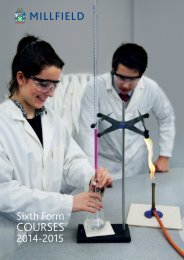COURSES
Create successful ePaper yourself
Turn your PDF publications into a flip-book with our unique Google optimized e-Paper software.
English as an Additional Language (EAL)<br />
Overview<br />
Pupils whose first language is not English, and who<br />
wish to apply for a place at a British university will<br />
need a recognised examination. If they have the<br />
GCSE (or IGCSE) in English (minimum grade C) or<br />
the IELTS (usually 6.5 – see IELTS section) they may<br />
not need to attend EAL lessons. If, however, they do<br />
not have either of these exams, they should attend<br />
lessons with the EAL department. Sixth Form pupils<br />
are prepared for both of these examinations, with<br />
the latter being the preferred qualification for British<br />
(and an increasing number of American) universities.<br />
Overseas pupils may also approach the EAL<br />
Department for specific language support in their<br />
work in other subject areas.<br />
Pupils who attend EAL lessons should think carefully<br />
about their choice of academic subjects. It may be<br />
necessary to limit these to three in order to leave<br />
sufficient time for EAL. Please ask for senior tutor or<br />
Head of EAL department for guidance if you are<br />
unsure.<br />
Approach<br />
New pupils will be assessed on their arrival at the<br />
school and assigned EAL lessons according to their<br />
need. Lessons will focus on the four skills (as follows)<br />
as well as addressing grammatical and lexical<br />
weakness revealed by individual test results. Clarity<br />
of communication and the ability to address a wide<br />
range of academic topics are the general aims of<br />
the course. We make use of formal classroom<br />
teaching in small groups as well as group discussion<br />
and computerised learning when appropriate.<br />
A Self-Access Centre and Computer Suite are<br />
available.<br />
Course outline<br />
In-line with the demands of the examinations, this<br />
course consists of training in the following skill areas:<br />
Writing<br />
• Describing graphs, charts and diagrams.<br />
• Short, factual reports.<br />
• Narrative summaries.<br />
• Planning, organising and paragraphing.<br />
• Discursive and argumentative essays.<br />
• Editing and self-correction.<br />
Reading Skills<br />
• Scanning, skimming and speed reading.<br />
• Extracting and summarising information.<br />
• Identifying fact, opinion and varying nuances.<br />
• Making inferences.<br />
• Vocabulary development.<br />
• Recognising stylistic features of academic texts.<br />
Listening<br />
• Short conversations on general topics.<br />
• Exposure to a variety of authentic accents.<br />
• Summarising specific points from a lecture.<br />
• Identifying discrete items of vocabulary.<br />
36<br />
Millfield Sixth Form Courses 2014-2015



